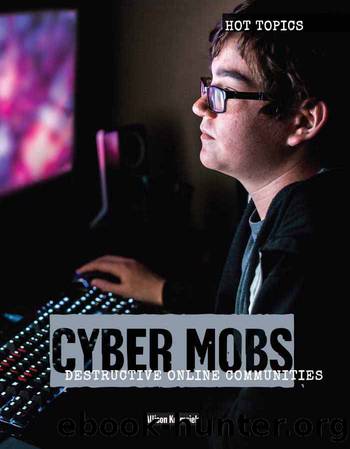Cyber Mobs by Krumsiek Allison;

Author:Krumsiek, Allison;
Language: eng
Format: epub
Publisher: Greenhaven Publishing LLC
Anonymous is a loosely organized group of hackers that comes together as a cyber mob for certain causes. It opposes terrorism, police brutality, cyberbullying, and other forms of harassment. In public, Anonymous members sometimes disguise themselves by wearing the style of mask made popular in the movie V for Vendetta.
Human Rights Violations
Universal human rights include not only access to the Internet, but being able to participate online without fear of discrimination. When cyber mobs or trolls use slurs, taboo words, and threatening language, they are abusing the human rights of a victim. Civil rights in the United States include freedom of speech and assembly. In the modern age, this can include being able to log on to the Internet and talk to other people. Victims of cyber mobs are often pushed out of online spaces. This violates their right to free assembly.
Many victims of cyber mobs will take a break from being online. Some will even leave the Internet permanently. Some victims, though, feel they cannot leave the Internet because they need to stand up for themselves and correct the false information being spread by the cyber mob. There is no right or wrong way to handle being a victim of lies online. Sometimes, correcting the cyber mob will make the harassment worse. Other times, victims feel more fear about leaving the conversation.
Another human right online, as defined by the Council of Europe, is the right to privacy. When a cyber mob steals and publishes personal information, it is violating human rights. Invading privacy and taking someoneâs information is theft. The theft of privacy is covered under laws and universal rights.
Changing the Internet for the Worse
Some trolls and cyber mobs may use denial of service to stop victims from using the Internet. A denial of service attack, sometimes abbreviated as DoS, is when the connection to the Internet is blocked. The victim may think it is a problem with their computer or even call their Internet service provider (ISP) to see what is wrong, but if the attack is caused by a troll, there may be nothing the ISP can do to fix it.
A New Twist on an Old Practice
In his book So Youâve Been Publicly Shamed, author Jon Ronson explained that public shaming makes people feel powerful. Until the 1830s, punishments in the United Kingdom and United States were held in the town square. People would be whipped or put in the stocks, and the general public would be invited to watch, laugh, and sometimes throw things at the person being punished. With the rise of the Internet, individuals once again have a public voice. Some may feel it is their duty to shame someone because they believe that when they do this, they are making the world a better place by stopping someone else from doing the same thing. Others may shame people in an effort to divert attention from their own mistakes.
Because of the dehumanizing effect of the Internet, people are much harsher when they publicly shame people online than they would be if someone they knew had made the same mistake.
Download
This site does not store any files on its server. We only index and link to content provided by other sites. Please contact the content providers to delete copyright contents if any and email us, we'll remove relevant links or contents immediately.
Pale Blue Dot by Carl Sagan(4600)
Cracking the GRE Premium Edition with 6 Practice Tests, 2015 (Graduate School Test Preparation) by Princeton Review(4020)
Pocahontas by Joseph Bruchac(4017)
Unfiltered by Lily Collins(3899)
The Emotionary: A Dictionary of Words That Don't Exist for Feelings That Do by Eden Sher(3209)
The Daily Stoic by Holiday Ryan & Hanselman Stephen(3094)
Factfulness_Ten Reasons We're Wrong About the World_and Why Things Are Better Than You Think by Hans Rosling(3039)
The President Has Been Shot!": The Assassination of John F. Kennedy by Swanson James L(2961)
Sapiens and Homo Deus by Yuval Noah Harari(2832)
Rogue Trader by Leeson Nick(2818)
The 48 laws of power by Robert Greene & Joost Elffers(2774)
The Rape Of Nanking by Iris Chang(2640)
Almost Adulting by Arden Rose(2578)
Gettysburg by Iain C. Martin(2566)
500 Must-Know AP Microeconomics/Macroeconomics Questions(2470)
The Plant Paradox by Dr. Steven R. Gundry M.D(2411)
The Innovators: How a Group of Hackers, Geniuses, and Geeks Created the Digital Revolution by Walter Isaacson(2410)
In the Woods by Tana French(2384)
Make by Mike Westerfield(2197)
